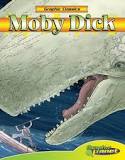Moby-Dick Page #4
Moby-Dick; or, The Whale is an 1851 novel by American writer Herman Melville. The book is sailor Ishmael's narrative of the obsessive quest of Ahab, captain of the whaling ship Pequod, for revenge on Moby Dick, the white whale that on the ship's previous voyage bit off Ahab's leg at the knee.
Genre: Action and Adventure
Genre: Action and Adventure
- Year:
- 1851
- 70,062 Views
CHAPTER 2. The Carpet-Bag. I stuffed a shirt or two into my old carpet-bag, tucked it under my arm, and started for Cape Horn and the Pacific. Quitting the good city of old Manhatto, I duly arrived in New Bedford. It was a Saturday night in December. Much was I disappointed upon learning that the little packet for Nantucket had already sailed, and that no way of reaching that place would offer, till the following Monday. As most young candidates for the pains and penalties of whaling stop at this same New Bedford, thence to embark on their voyage, it may as well be related that I, for one, had no idea of so doing. For my mind was made up to sail in no other than a Nantucket craft, because there was a fine, boisterous something about everything connected with that famous old island, which amazingly pleased me. Besides though New Bedford has of late been gradually monopolising the business of whaling, and though in this matter poor old Nantucket is now much behind her, yet Nantucket was her great original—the Tyre of this Carthage;—the place where the first dead American whale was stranded. Where else but from Nantucket did those aboriginal whalemen, the Red-Men, first sally out in canoes to give chase to the Leviathan? And where but from Nantucket, too, did that first adventurous little sloop put forth, partly laden with imported cobblestones—so goes the story—to throw at the whales, in order to discover when they were nigh enough to risk a harpoon from the bowsprit? Now having a night, a day, and still another night following before me in New Bedford, ere I could embark for my destined port, it became a matter of concernment where I was to eat and sleep meanwhile. It was a very dubious-looking, nay, a very dark and dismal night, bitingly cold and cheerless. I knew no one in the place. With anxious grapnels I had sounded my pocket, and only brought up a few pieces of silver,—So, wherever you go, Ishmael, said I to myself, as I stood in the middle of a dreary street shouldering my bag, and comparing the gloom towards the north with the darkness towards the south—wherever in your wisdom you may conclude to lodge for the night, my dear Ishmael, be sure to inquire the price, and don't be too particular. With halting steps I paced the streets, and passed the sign of “The Crossed Harpoons”—but it looked too expensive and jolly there. Further on, from the bright red windows of the “Sword-Fish Inn,” there came such fervent rays, that it seemed to have melted the packed snow and ice from before the house, for everywhere else the congealed frost lay ten inches thick in a hard, asphaltic pavement,—rather weary for me, when I struck my foot against the flinty projections, because from hard, remorseless service the soles of my boots were in a most miserable plight. Too expensive and jolly, again thought I, pausing one moment to watch the broad glare in the street, and hear the sounds of the tinkling glasses within. But go on, Ishmael, said I at last; don't you hear? get away from before the door; your patched boots are stopping the way. So on I went. I now by instinct followed the streets that took me waterward, for there, doubtless, were the cheapest, if not the cheeriest inns.
Translation
Translate and read this book in other languages:
Select another language:
- - Select -
- 简体中文 (Chinese - Simplified)
- 繁體中文 (Chinese - Traditional)
- Español (Spanish)
- Esperanto (Esperanto)
- 日本語 (Japanese)
- Português (Portuguese)
- Deutsch (German)
- العربية (Arabic)
- Français (French)
- Русский (Russian)
- ಕನ್ನಡ (Kannada)
- 한국어 (Korean)
- עברית (Hebrew)
- Gaeilge (Irish)
- Українська (Ukrainian)
- اردو (Urdu)
- Magyar (Hungarian)
- मानक हिन्दी (Hindi)
- Indonesia (Indonesian)
- Italiano (Italian)
- தமிழ் (Tamil)
- Türkçe (Turkish)
- తెలుగు (Telugu)
- ภาษาไทย (Thai)
- Tiếng Việt (Vietnamese)
- Čeština (Czech)
- Polski (Polish)
- Bahasa Indonesia (Indonesian)
- Românește (Romanian)
- Nederlands (Dutch)
- Ελληνικά (Greek)
- Latinum (Latin)
- Svenska (Swedish)
- Dansk (Danish)
- Suomi (Finnish)
- فارسی (Persian)
- ייִדיש (Yiddish)
- հայերեն (Armenian)
- Norsk (Norwegian)
- English (English)
Citation
Use the citation below to add this book to your bibliography:
Style:MLAChicagoAPA
"Moby-Dick Books." Literature.com. STANDS4 LLC, 2024. Web. 2 May 2024. <https://www.literature.com/book/moby-dick_18>.




Discuss this Moby-Dick book with the community:
Report Comment
We're doing our best to make sure our content is useful, accurate and safe.
If by any chance you spot an inappropriate comment while navigating through our website please use this form to let us know, and we'll take care of it shortly.
Attachment
You need to be logged in to favorite.
Log In